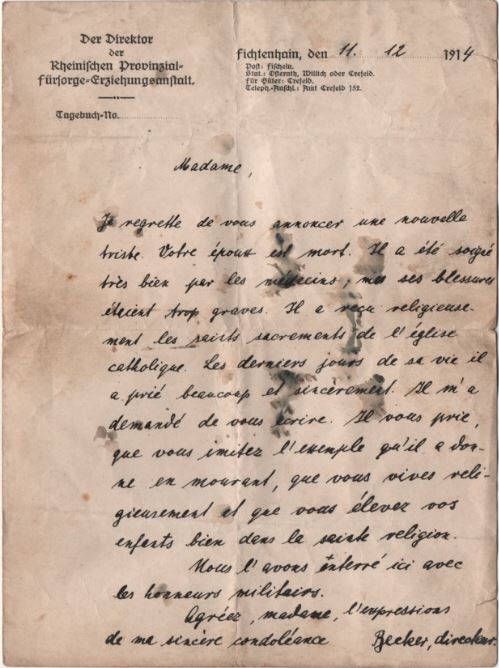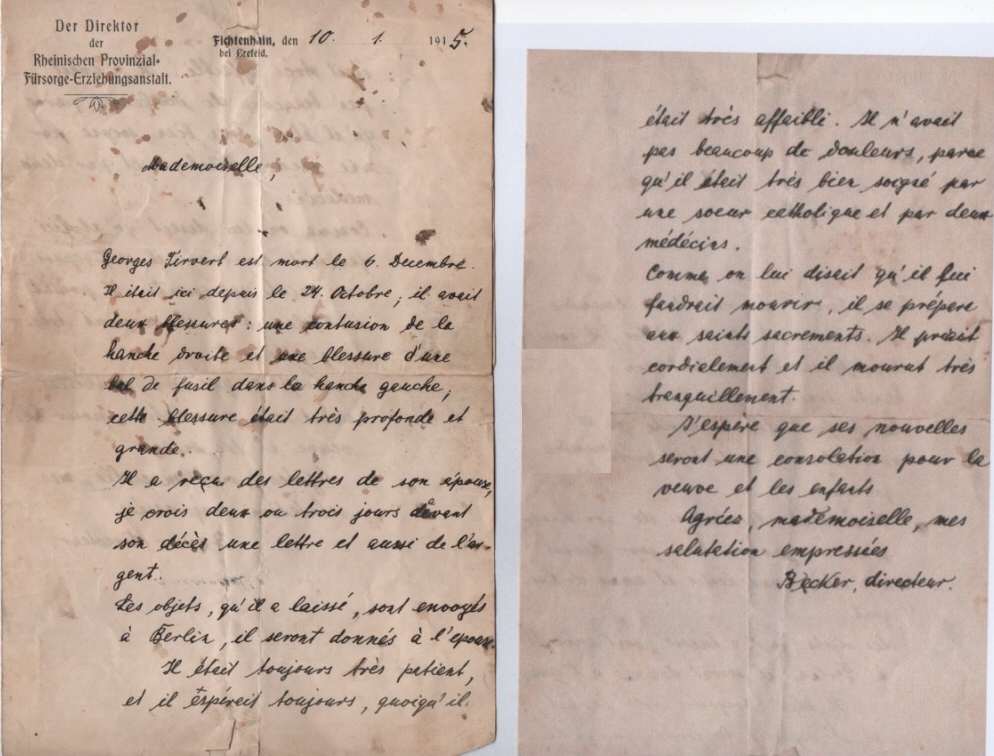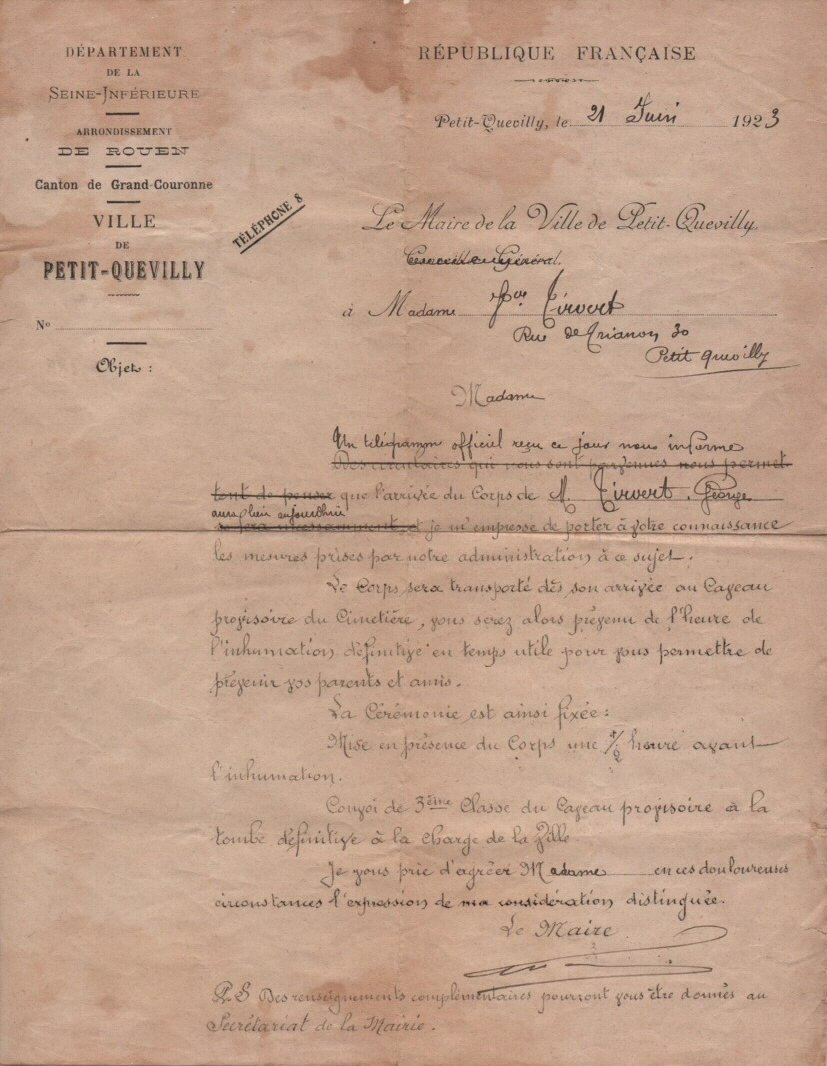During our exhibition organized in November 2018 on the occasion of the 100th anniversary of the 1918 armistice, a Yerrois entrusted us with three particularly interesting documents concerning his grandfather, Georges Tirvert, "died for France" on December 6, 1914.
Georges' regiment was sent to the Lille-Arras region to contain a possible German advance in that direction. His regiment was used, among other things, to dig trenches. The German invasion through Belgium will put these soldiers on the front line and many will be wounded or lose their lives.
Wounded on the battlefield, 40-year-old Georges Tirvert was transported on October 24 to a German auxiliary hospital set up on the Fichtenhain campus south of the city of Krefeld. In peacetime, this campus housed a social education institution created in 1904 by the Rhineland Provincial Association, which housed up to 225 boys considered "difficult to educate".
On December 11, 1914, Mr. Becker, director of the hospital where Georges Tirvert died, wrote a first letter to Georges' wife to inform her of the circumstances of her husband's death:

|
Fichtenhein, on 11/12/1914
Madam,
I regret to inform you of a sad news. Your husband has died. He was treated very well by the doctors, but his injuries were too serious. He religiously received the holy sacraments of the Catholic Church. The last days of his life he prayed a lot and sincerely. He asked me to write to you. He begs you that you imitate the example he gave in dying, that you live religiously and that you raise your children well in the only religion.
We have buried him here with military honors.
Please accept, Madam, the expression of my sincere condolences
Becker, Director
|
On January 10, 1915, he writes a second letter announcing the death of Georges to a "Mademoiselle" who is not identified:

|
Fichtenhein, le 10/01/1915
Miss,
Georges Tirvert died on December 6. He had been here since October 24; he had two wounds: a contusion of the right hip and a gunshot wound in the left hip; this wound was very deep and large.
He received letters from his wife, I think two or three days before his death a letter and also money.
The things he left behind are being sent to Berlin, they will be given to the wife.
He was always very patient, and he always hoped, even though he was very weak. He did not have much pain, because he was very well cared for by a Catholic sister and two doctors.
As he was told that he would have to die, he prepared himself for the holy sacraments. He prayed cordially and died very quietly.
I hope that this news will be a consolation for the widow and the children.
Please accept, Miss, my warmest greetings
Becker, director
|
The third document, issued by the Mayor of
Petit-Quevilly, specifies the conditions under which Georges' body will be repatriated for burial in France:

|
Petit-Quevilly, June 21, 1923
The Mayor of the city of Petit-Quevilly
General Councillor
To Mrs. Tirvert widow of the late Georges Tirvert
Madam,
Circulars which have reached us allow us to think that
An official telegram received today informs us
that the arrival of the body of Mr. Tirvert Georges
will be done incessantly and
will take place today and I hasten to inform you of the measures taken by our administration on this subject.
The body will be transported as soon as it arrives to the provisional vault of the cemetery, you will then be informed of the time of the final burial in good time to allow you to warn your relatives and friends.
The ceremony is scheduled as follows:
Placement of the body ½ hour prior to burial.
Convoy of 3rd class from the temporary grave to the final grave at the expense of the city.
Please accept, Madam, in these painful circumstances, the expression of my distinguished consideration.
The Mayor …
P.S.: Further information can be obtained from the secretary's office of the town hall.
|
But let's hear from his grandson:
"He was born in 1874, a soldier in the 2st Territorial Infantry Regiment, 12th Company, number 925 in the Rouen North recruitment, in 1894.
"He was married and had four children, four sons.
"He was somewhere near the front, in the very first weeks of the conflict, in 1914.
"He was wounded by bullets during a confrontation between belligerents. He was picked up by German soldiers and sent to a reserve hospital in Germany, near Krefeld, where he was treated by German doctors.
"Unfortunately, his wounds were too severe and he died in the hospital on December 6, 1914. He was buried on the spot by the German authorities, before his remains were returned to his family on June 21, 1923 for burial in his hometown.
"Why am I telling you this sad story? Why does this isolated case among millions of others at least as painful deserve your attention?
"Because Mr. Becker, the director of the hospital where he was treated, communicated with this soldier's family by letters after his death. I read these letters and was deeply moved. In his correspondence, beyond the horrors of combat, beyond the tragedies, this man was simply capable of kindness, compassion and empathy for those who some would have called enemies.
"He sought to comfort the family as much as possible, with simple, brotherly words.
"These letters are for me testimonies of brotherhood and love, in the midst of the barbarity of the time.
"This soldier who died 'in battle' as we used to say, this man was called Georges Tirvert, and he was simply my grandfather."
See also:
Identification sheet of the
Poilu Georges Tirvert "mort pour la France" [Dead for France]


